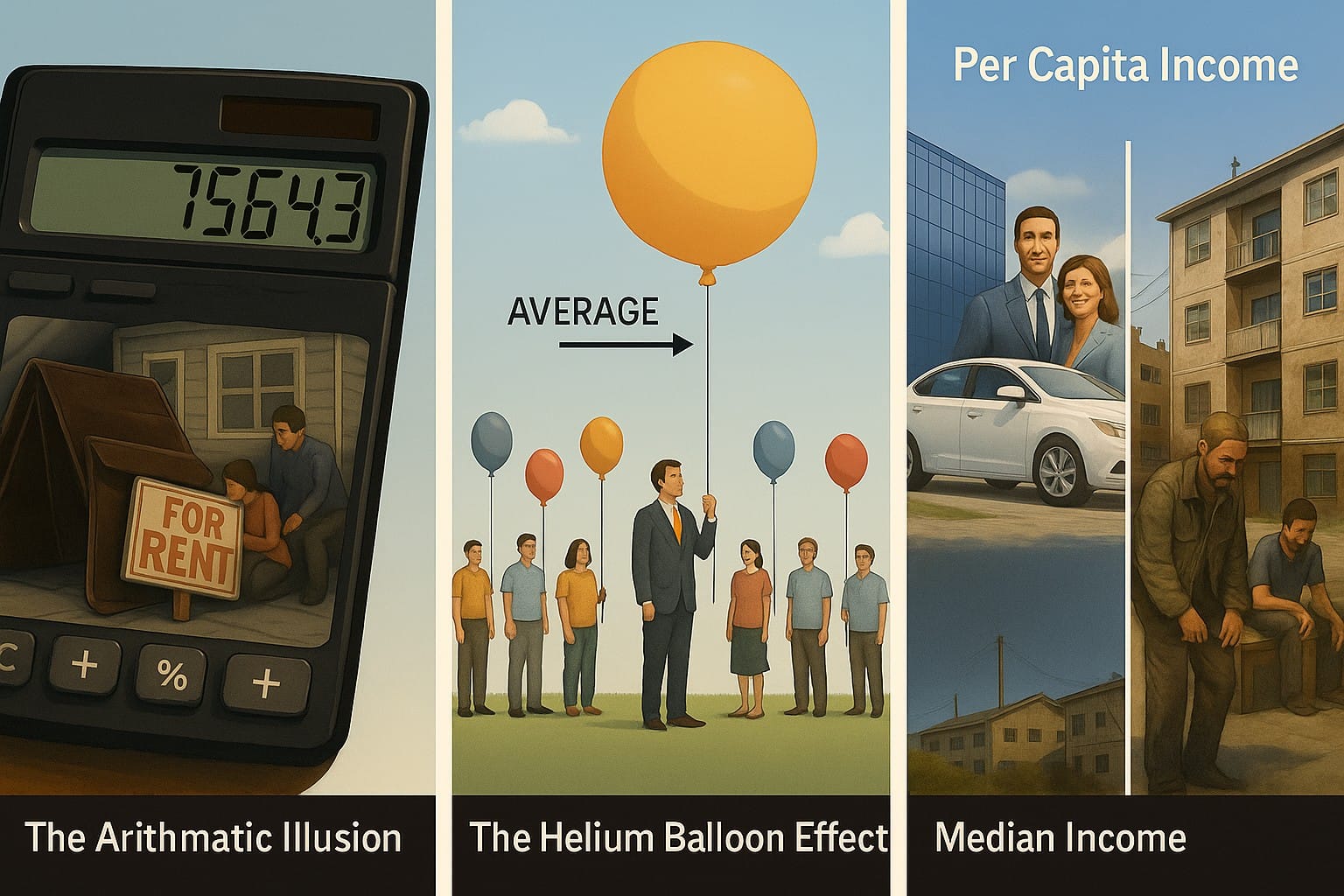
If you've ever wondered why certain groups clutch per capita income statistics like a security blanket, here's your answer: it's the most respectable way to lie without technically lying.
Per capita income is numerical sleight of hand. It makes wealthy regions appear wealthier, struggling communities appear ungrateful, and extractive industries appear philanthropic. The math is technically correct. The story it tells? That's where things get creative.
Let's examine why per capita income consistently misrepresents reality, and why the people waving it around—anti-tax crusaders, corporate PR departments, fossil fuel lobbyists—would rather you never discovered the median.
The Problem with Averages: A Brief Introduction to Mathematical Fiction
Per capita income couldn't be simpler:
Total income ÷ total population.
Every dollar earned gets tossed into a collective pot and divided equally. On paper, anyway. In reality, the janitor and the CEO share precisely nothing except a line on a spreadsheet.
Here's what averages do brilliantly: they hide inequality.
Put 100 people in a room. Give one person enough wealth to fund a private space program. Congratulations—your per capita income just achieved liftoff. Whether the other 99 people can afford groceries becomes statistically invisible.
Per capita income excels at three things:
- Making struggling regions appear prosperous
- Camouflaging wage stagnation
- Convincing people their economic anxiety is somehow irrational
It's not data visualization. It's data obfuscation with a diploma.
Why Median Income Ruins Everything (For Liars)
The median is unglamorous. Unspinnable. It identifies the middle person—half earn more, half earn less. No billionaires hijacking the calculation like economic hot air balloons.
Median income answers one fundamental question: "What does an actual household make?"
Every serious economist recognizes the median as superior for measuring financial health. It reveals distribution rather than distortion. It shows you the lived experience instead of the statistical fantasy.
If per capita income is the glossy resort brochure, median income is the honest Yelp review. Guess which one powerful interests desperately hope you ignore.
Who Adores Per Capita Income? Let's Name Names.
Anti-Tax Groups: "We're Already Rich. Stop Asking for Things."
Anti-tax advocates deploy per capita income like magicians deploy smoke—to distract you while they palm the truth.
The performance goes like this:
- "Our province is wealthy per capita!"
- "Therefore, we don't need higher taxes."
- "Government just wastes money anyway."
What they're not mentioning:
- What the median household actually earns
- Whether wages have increased in a decade
- Whether housing costs are devouring family budgets
- Whether that "prosperity" belongs to three guys and their holding companies
Per capita income provides a tidy number they can weaponize. Suddenly, you're unreasonable for wanting functional healthcare, decent schools, maintained infrastructure, or social supports that don't require a humiliation ritual to access.
This isn't just spin. This is spin with footnotes.
Corporations: "Behold Our Generosity (Please Ignore Our Payroll)"
Corporations adore per capita income because it allows them to:
- Claim credit for wealth they didn't distribute
- Suggest their presence lifts all boats (it doesn't)
- Obscure stagnant wages
- Downplay precarious employment
- Perform as economic saviours while paying contract workers poverty wages
Imagine a province with one massive tech firm paying a small cohort six-figure salaries while everyone else scrambles through the gig economy. Per capita income climbs. The corporation gestures at the number: "See? We're creating prosperity."
Meanwhile, median income whispers: "Actually, most people can't afford rent."
This is why corporations prefer per capita—it makes them appear generous when all they've actually done is exist near poor people.
Fossil Fuel Companies: Olympic Champions of Per Capita Manipulation
If per capita income had a fan club, the oil and gas industry would be its founding members, major donors, and entire board of directors.
Extraction industries generate:
- Massive corporate revenues
- Extraordinarily high salaries for a narrow professional class
- Volatile boom-bust cycles that devastate regional stability
- Geographic inequality
- Profits that frequently exit the province entirely
Yet their messaging never wavers: "We make the province rich."
What they're banking on you not noticing:
- Most residents don't work in extraction
- Most income concentrates among a small elite
- Resource booms inflate local prices for everyone
- Wealth distribution remains stubbornly lopsided
- When commodity prices collapse, entire economies hemorrhage
- Long-term costs—environmental remediation, public health impacts, infrastructure degradation—get conveniently omitted from the calculation
Per capita income lets them spread the earnings of a tiny, highly compensated group across the entire population like cheap butter. Suddenly, the province appears wealthy. On paper.
Check the median and you discover:
- Household incomes haven't budged
- Most people aren't participating in the boom
- Affordability is deteriorating
- Inequality is widening
- Economic dependency is deepening
Per capita income is how fossil fuel companies declare "We're lifting everyone out of poverty," while the median reveals most households are standing on the same rung they occupied a decade ago. Possibly a lower one.
Why They Fear the Median
Median income demolishes the narrative. It announces:
- Prosperity isn't shared
- Wages aren't rising for most households
- Inequality isn't a glitch—it's the operating system
- Corporate earnings ≠ public well-being
- Resource-dependent regions are far more fragile than advertised
Median income exposes trickle-down economics for what it is: a promise scribbled on a cocktail napkin that somehow metastasized into public policy.
Anti-tax groups can't use median income. It eviscerates their arguments. Corporations can't use median income. It ruins the performance. Fossil fuel companies really can't use median income. It shatters the illusion entirely.
Per capita income says "everyone's thriving!" Median income says, "No. They're not."
And that's precisely why the people profiting from inequality prefer the former.
The Real Danger: Mistaking Mathematical Abstraction for Human Reality
Using per capita income to measure economic health resembles judging a hospital's performance by averaging every patient's temperature. Sure, you get a number. The guy with a 104-degree fever is still dying.
Per capita income conceals:
- Affordability crises
- Wage stagnation
- Boomtown housing inflation
- Crushing household debt
- Regional inequality
- The disappearing middle class
It's a number that makes inequality vanish—on paper only. In reality, people are still struggling. They're just statistically invisible now.
What Honest Analysis Requires
If you want truth instead of propaganda, you need:
- Median household income (the actual middle)
- Income distribution (Gini coefficient, percentile breakdowns)
- Cost of living metrics (housing, food, transportation)
- Economic diversification (or terrifying lack thereof)
Together, these metrics tell the real story: Who's thriving? Who's barely surviving? How fragile is this supposed prosperity?
Spoiler: In most cases, far more fragile than the per capita cheerleaders admit.
Final Thought: Always Ask Who Benefits
Whenever someone brandishes per capita income and announces, "Look how wealthy we are!"—pause. Ask one question:
Who's "we"?
Because here's the truth that makes powerful people uncomfortable:
Per capita income measures the wealth of a place. Median income measures the wealth of the people living there.
Those two numbers often tell radically different stories.
One is an illusion. One is reality.
And the loudest advocates of the illusion always—always—benefit from keeping you in the dark.
(Which is precisely why they're so loud.)


